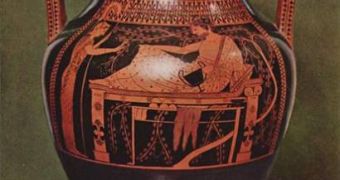While investigating a cave in the southern Chinese province of Hunan, archaeologists discovered pottery fragments more than 18,000 years old, the most ancient ones ever found. Until now, the oldest pieces of ceramics ever found were created between 15,000 and 16,000 years ago, also in East Asia. While, for the rest of the world, pottery started becoming common at the beginning of the Neolithic era, some 10,000 years ago, the fresh evidence shows that, for East Asian populations, the craft was common even 8,000 years ahead.
The newly discovered fragments are indigenous to the late Paleolithic, when most humans still hadn't given up their hunter-gatherer behavior, and settled down in communities. In the eastern part of the Mediterranean Sea, around Greece and Macedonia, pottery began after the Neolithic age set in, when steady communities meant that demand for such commodities as pots and various other objects was increasing.
According to archaeologists Elisabetta Boaretto, from the Weizmann Institute of Science in Rehovot, Israel, and Xiaohong Wu, from the Peking University in Beijing, the new fragments are undoubtedly made of fired clay, molded by hand into a useful container.
“In environments in which there is a lot of ash, charcoal doesn't preserve well, and throughout China there are deposits of windborne dust that contain a lot of calcite, an element of wood ash,” Nature News quotes Weizmann Institute Kimmel Center for Archaeological Science expert Steve Weiner as saying.
He added that analyzing the rock layers found in the area proved to be very difficult, mostly because of the mixed layers of ash and dust that could be found at the location. No bones or charcoal samples have thus far been found, so no one knows for sure how old the cities they discovered around the Yuchanyan Cave are. Early estimates place them in the Late Pleistocene period.
“There are a lot of excavations going on in China now, and I suspect that there will be many more discoveries that will give us a better understanding of the development of human society in this part of the world,” concluded archeology expert Gideon Shelach from Hebrew University in Jerusalem, Department of East Asian Studies.

 14 DAY TRIAL //
14 DAY TRIAL //